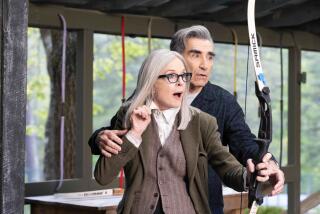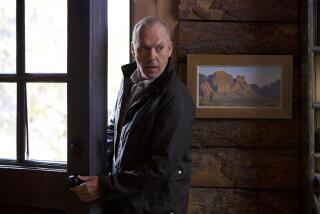Silent Treatment
- Share via
When Buster Keaton made “The General” in 1927, it was a budget-buster. The crew went on location, hired 500 extras, built a railroad trestle and a dam, then blew both up and sank a train into the river.
The whole movie cost $250,000.
By today’s “Titanic’-size standards, that’s petty cash. But at the time, remembers Keaton’s widow, Eleanor Keaton, “They thought he was going to break the company.”
Only moderately successful at the time, “The General” grew in prestige year by year and now is considered by film scholars and movie lovers alike to be one of the greatest silent films ever made.
On Saturday, the movie will get the treatment: screening at the 1920s-era Alex Theatre in Glendale, accompanied by the Los Angeles Chamber Orchestra. Timothy Brock will conduct the score, written by British composer Carl Davis about 10 years ago.
Buster Keaton always considered “The General” to be “his baby,” said Eleanor Keaton, because he found the book, “The Great Locomotive Chase,” and brought it to the team of writers at his independent studio.
The film is based on a true story of how Union spies stole a train--’The General’--from the Confederacy.
Keaton, who also directed the movie, plays the train’s Southern engineer, Johnny Gray. He is turned down by the Confederate Army when he tries to enlist because he is more valuable to the South as an engineer.
But his civilian status makes the lovely Annabelle Lee (Marion Mack) believe he is a coward. When the only two things he loves in the world--The General and Annabelle--are stolen by the Union spies, he goes to heroic lengths to get them back.
The film is subtly funny, not slapstick. Like Keaton’s other great works, he develops the continuous physical gag, where the humor emerges as much from how long it goes on as from what actually happens.
Eleanor Keaton, who has a near-encyclopedic memory of Keaton’s films, was 21 when she married him in 1940. He was 44, twice divorced. They were married until 1966, when he died of cancer. Now a spry 79, Eleanor Keaton lives in a condominium in Toluca Lake decorated with posters from her late husband’s films.
Exteriors for “The General” were filmed on location in Oregon, she said, where in black-and-white, the pine-dotted landscape could pass for Georgia. They hired 500 members of the Oregon National Guard to play the armies. “Each had a blue uniform and a gray uniform, and they would charge back and forth.”
The National Guard came in handy when some sparks coming off the locomotive smokestack started a fire in the pine forest. They made fairly quick work of putting it out, but there was so much smoke hovering overhead that filming had to cease until rain cleared the air.
Also, in 1927, special effects meant actually blowing up a railroad trestle. Keaton and company built it, then dammed the small river running beneath so it would look as deep and wide as the Mississippi. “In those days, there was no back-projection or anything,” Eleanor Keaton said.
And for Keaton, there were also no stuntmen. For the film “Steamboat Bill Jr.,” for example, he had a 6,000-pound wall of a house fall down around him--while he was spared by passing through an open window.
Such risk-taking was in his blood. Keaton grew up in the medicine shows and vaudeville where his father would literally throw young Buster across the stage and against the scenery. He got so good at his craft that in New York, where the child labor laws were tough, Keaton’s parents passed him off as a midget instead of a child.
At 21, he left the show and went to work for Roscoe “Fatty” Arbuckle, making short comic movies. After a scandal ruined Arbuckle’s career, Keaton teamed up with producer Joseph Schenck and made his best movies: ‘Sherlock Jr.,” “The Navigator,” “Steamboat Bill Jr.” and, of course, ‘The General.”
In 1995, the year that would have been Buster Keaton’s 100th birthday, Eleanor Keaton globe-trotted from one film festival to another, from Berlin to Rio, from Michigan to Kansas, and at each one she saw “The General.”
“I know every frame,” she said.
But, she said, she’ll happily watch it again. “I enjoy helping perpetuate his name. I think he deserves it,” she said. “I’d prefer the younger generation heard of him and the older generation didn’t forget.”
BE THERE
The Los Angeles Chamber Orchestra’s Silent Film Gala, featuring Buster Keaton’s “The General,” at the Alex Theatre, 216 N. Brand Blvd., Glendale. $25-$200. (213) 622-7001, Ext. 275.
More to Read
The biggest entertainment stories
Get our big stories about Hollywood, film, television, music, arts, culture and more right in your inbox as soon as they publish.
You may occasionally receive promotional content from the Los Angeles Times.










